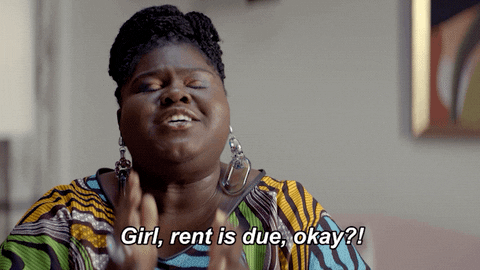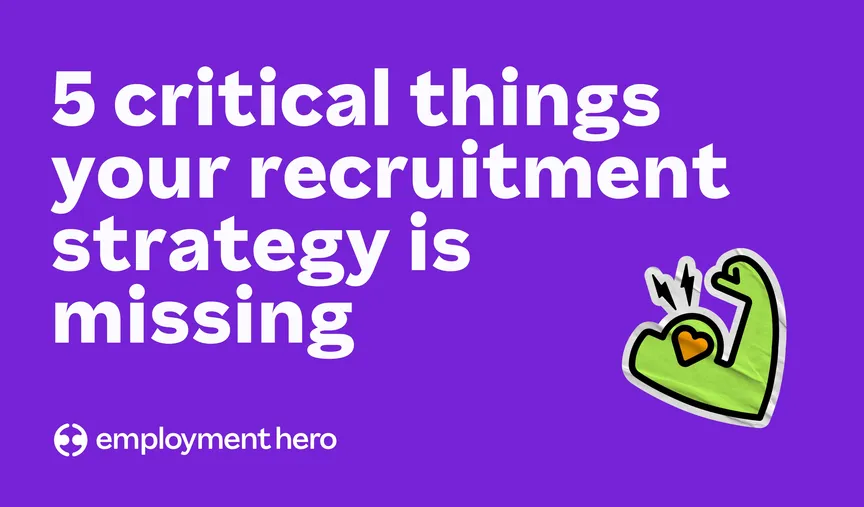How to ask for a rent reduction during COVID-19
If you’re considering asking for a rent reduction as a result of COVID-19, we’re here to help you take that first step.

Contents
One of the main reasons I love working at Employment Hero is because I get to work with a group of pretty superb humans who share the same values as I do. This has never been made more evident than it has during COVID-19.
The desire of everyone truly wanting to do what they can to help Australian businesses has quite literally been tear-jerking.
The fact that we can produce webinars and guides on important topics like JobKeeper that actually help answer all those confusing questions has been something I’ve felt very grateful for.
This is mainly because I have scores of mates who run their own small businesses who are really struggling right now to understand their obligations to their business and to their staff.
So, now I want to try and extend the help offered to employers by extending what I can to all the affected workers out there, too. cu
Be it fate or misfortune, I now have a frightful amount of knowledge regarding JobKeeper, JobSeeker and just about every other announcement that ScoMo has made in the last month.
Due to this wealth of very dry information, I have found myself talking mates through their employee rights, being made redundant vs being stood down and mostly, how to approach their real estate agent to seek a rent reduction during COVID-19.
I want to share some of this advice publicly in case anyone else out there finds it useful.
It’s the last thing you feel like doing right now
If you’re in the position where you’re considering asking for a rent reduction as a result of COVID-19, then chances are in the last month, you’ve not only been surviving a global pandemic but also been dealing with a radical change in your employment situation, expected income and become very familiar with the hold message from Centrelink.
It’s a LOT to deal with, and chances are, you’re probably just feeling pretty done with the whole thing, so dealing with your real estate agent is the last thing you feel like doing, AND THAT’S OKAY.
Are you the only one in your household on the lease? If not, is anyone better placed to take up this cause? Your first course of action should be to make sure you have the capacity to have what might be some difficult conversations.
Take some time to recharge before tackling this one. Personally, I love getting stuff like this over and done with the first thing, so I don’t have to think about it all day!
Government help ain’t coming
I know many of us have been holding our breaths waiting for a government directive on rent, but sadly it seems like that is not going to happen, for residential leases anyway, so we need to take matters into our own hands.However, you can explore some ways to manage your finances during these times by checking out our guide on cutting costs at home. This can provide practical steps to ease your financial burden.
Just because there is no government-backed rent relief in relation to COVID-19 doesn’t mean you won’t be able to receive a rent reduction.
States are encouraging landlords to negotiate a rent reduction with tenants who’ve lost their incomes from COVID-19 in good faith and offering tax breaks as an incentive. Whilst many states have introduced a moratorium on evictions, that doesn’t stop debt piling up against your name in the meantime if you can’t afford to pay your normal rent.
Most landlords are well aware they are not immune to the effects of a global economic downturn and in most cases, would rather keep a steady income, even if lower than normal, than try and re-rent their property in a pandemic! It’s also worth noting that landlords who lost rental incomes will be able to defer their mortgage repayments by up to six months under support measures for borrowers announced by the big banks earlier this month.
Read more: Government vouchers for COVID-19 relief
Get it in writing
If you’re anything like me, the thought of phone calls is anxiety-inducing, so don’t put any pressure on yourself, there is nothing wrong with first reaching out by email (there will be a template at the end of this blog). There are several reasons why I’m suggesting email.
Firstly, so you can include both your managing agency and your landlord in the conversation (send to your landlord and cc your agent). An agent at this time is trying to protect income for their businesses and a reduction in rent will impact them also, so it’s important all affected parties keep an open line of communication.
At the end of the day, however, it will be your landlord you need to convince of the need for reductions.
Secondly, I have a few mates that are managing agents and whoooooo boy are they busy right now. A call may not only result in a missed connection but might also lead to something being missed or not followed up properly because they are juggling so many things.
Thirdly, it makes it much easier to keep emotion out of the negotiations by emailing. Your property manager may ask you to chat about the rent reduction over the phone, but it’s definitely worth sending the initial email.
Your agent may also be busy and would prefer to negotiate by email, but by providing the specifics of what you’re after, you’ll decrease the need for back and forths and hopefully get you your outcome sooner!

Be realistic
Be realistic with the amount in reduction you are asking for. If your overall household income has been slashed by 30%, I suggest asking for a 30% reduction.
It might also help to do your research. I’ve noticed in my area on the Northern Beaches of Sydney, the average rental price of a 2-bedroom flat has dropped around 25% in the last month – so seeking a reduction of 20-25% in this scenario would seem totally realistic.
You could run a search on a real estate site for properties that have the same criteria (i.e. the same suburb, the same number of bedrooms, car spaces, location, amenities) to see how your current rent compares.
Provide evidence
I know it feels like you’re having to give over so much personal detail at the moment, between JobSeeker applications and looming government-enforced location tracking – it feels like more and more like 1984 every day – BUT – you are going to have a lot more success if you can prove to your landlord your income has been affected.
I’d suggest including a letter of severance from your employer and/or screenshots of the changes in your income or copies of your payslips showing the decrease. For those facing reductions in work hours, you might find our reduced hours agreement template useful for documenting these changes. If you need help in negotiating a pay cut with your employer, our Agreement for Salary Reduction Letter Template can guide you through the process.

Be polite
As the saying goes, you get more bees with honey, so remember, this letter needs to address your issues in a positive tone and get the negotiations off on the right foot. Explain how your adjustment is in line with market changes, and link up some similar properties as an example.
Thank the landlord for considering the reduction and acknowledging they may also be affected by the current climate. Remember – many property owners are in exactly the same position as tenants in that they’ve lost their job as well.
Think about having someone you trust to read over your email before you send it to ensure your tone is friendly and your spelling and grammar is correct.
I hope these tips help you be successful in asking for a rent reduction during COVID-19. Good luck!
Rent reduction request letter template
Please see a template letter below.
[Your Name]
[Your Address]
[Date]
[Name of Landlord or Agent]
[Their Address as Printed on lease or tenancy documents]
Title: Request to negotiate rent payments due to COVID-19
Dear [Mr/Mrs/Ms Landlord’s name],
[I am/We are] contacting you about our [weekly/fortnightly/monthly] rent payments for [property address]. [My/Our] financial circumstances have changed significantly due to COVID-19 because of [reasons for income reduction]. [My/Our] household income per week was originally [outline your household’s original work income/work hours, include any Government payments received].
Following [reasons for household income reduction], [our/my] household income is now [outline what your household’s income is and include any Government payments received]. This change happened on [date of change in circumstances due to COVID-19]. Please find attached documentation outlining [my/our] previous and current household income.
Because of this, [I/we] would like to discuss the possibility of reducing rent payments to [$xxx] for the next [months/fortnights]. Prime Minister Scott Morrison has advised landlords and tenants to sit down together to find a way to survive this challenging period. He indicated that this is ‘a burden for everyone to share’. The pandemic will continue for some time, and the Treasurer has said a recession seems inevitable.
[We/I] believe that a reasonable reduction in rent is in everyone’s interest. [We/I] appreciate that you may also be experiencing financial hardship at this time and look forward to discussing this matter further with you.
Stay safe and kind regards,
Your Name and Signature,
Your Phone Number, Your Email Address
The following does not constitute legal advice. Always seek advice from your local Tenants’ Advice and Advocacy Service about your options – tenants.org.au/get-advice.
More COVID resources
If you’re looking for more resources, you can visit the Employment Hero COVID-19 resource hub here.
Here are some example resources you will have access to:
- What are employee’s rights to leave and pay during COVID-19?
- When your home isn’t safe
- What is a COVID-19 employee assistance program?
- How to support frontline workers during the pandemic
- The impacts of COVID-19 and mental health at work
In these challenging times, it’s also crucial to know how you can support employees through the cost of living crisis. Here are some ways to help.
Related Resources
-
 Read more: Guide to long service leave entitlements in Australia
Read more: Guide to long service leave entitlements in AustraliaGuide to long service leave entitlements in Australia
Understanding long service leave entitlements can be challenging. We share everything employers need to know about managing it.
-
 Read more: The $124,000 Cashflow Crunch: Small and Medium Businesses (SMBs) at risk under proposed Payday Super Requirements
Read more: The $124,000 Cashflow Crunch: Small and Medium Businesses (SMBs) at risk under proposed Payday Super RequirementsThe $124,000 Cashflow Crunch: Small and Medium Businesses (SMBs) at risk under proposed Payday Super Requirements
New Employment Hero modelling and research shows businesses will need an extra $124,000 in working capital on average to meet…
-
 Read more: From hiring mismatch to SmartMatch: 5 critical things your recruitment strategy is missing
Read more: From hiring mismatch to SmartMatch: 5 critical things your recruitment strategy is missingFrom hiring mismatch to SmartMatch: 5 critical things your recruitment strategy is missing
We’ve wrapped up five critical things your recruitment strategy might be missing so you can feel confident in your hiring…




















